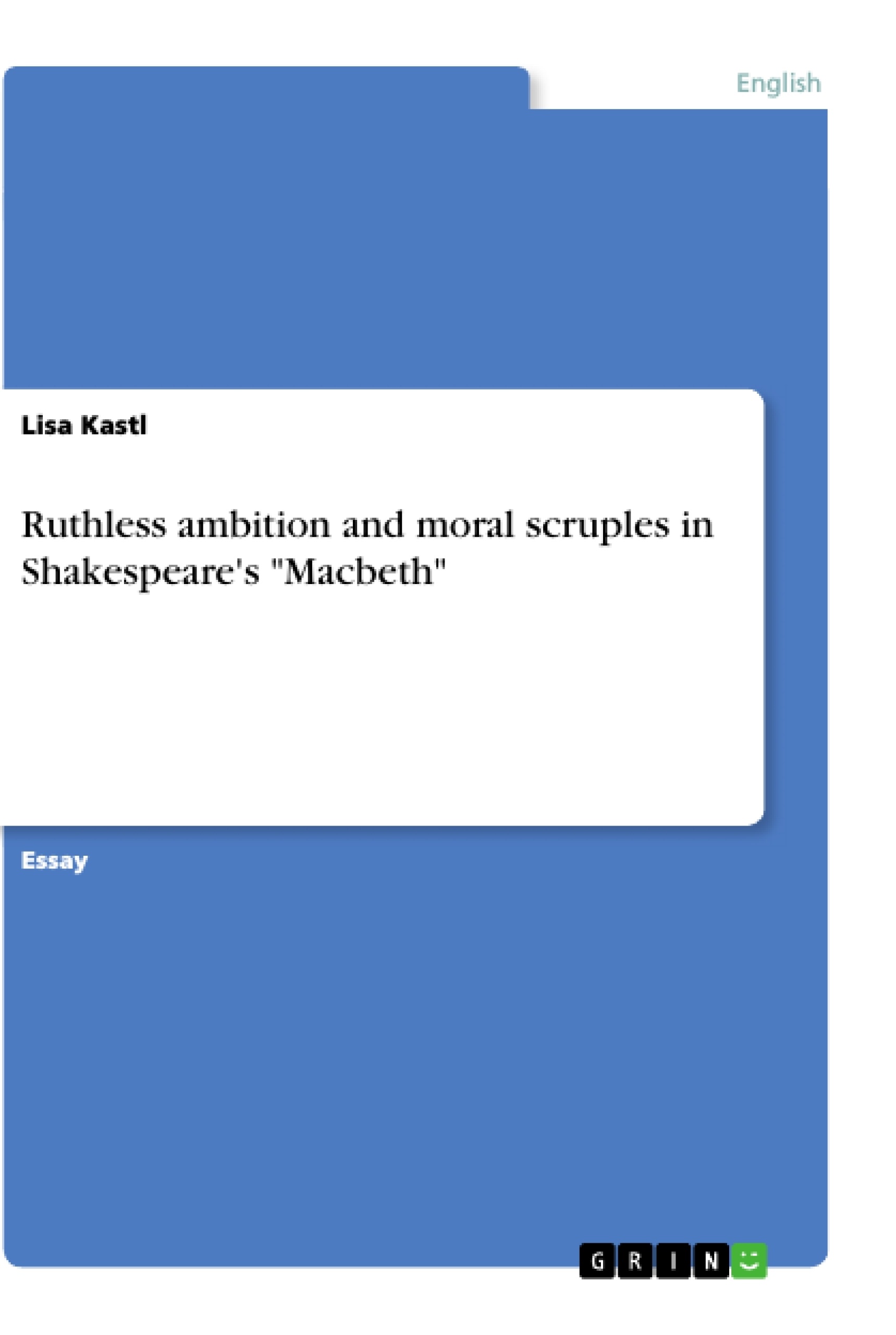Is Macbeth blinded by his ruthless ambition? Or does he still have moral scruples? This essay is an analysis of the figure Macbeth with the aim to proof that he does have moral scruples, which eventually lend credence to his character.
Macbeth is certainly one of the shortest tragedies written by William Shakespeare. Still, it is one of the most well-known Shakespearean tragedies. The entire play consists of only five acts which tell the story of the ambitious Thane of Glamis Macbeth, who murders his king in order to accede to the throne. The main character shows an unusual complexity for such a concise play.
Table of Contents
- Reflection on Ruthless Ambition and Moral Scruples in Shakespeare's Macbeth
Objectives and Key Themes
This essay analyzes Macbeth's character in Shakespeare's play, aiming to demonstrate that despite his ruthless ambition, he retains moral scruples that contribute to his character's complexity. The analysis focuses on a key soliloquy to reveal Macbeth's inner conflicts and motivations.
- Macbeth's ruthless ambition and its consequences.
- Macbeth's remaining moral scruples and inner conflicts.
- The use of dramatic devices, such as soliloquy and imagery, to portray Macbeth's character.
- The role of prophecy and fate in shaping Macbeth's actions.
- The comparison between Macbeth and other historical figures.
Chapter Summaries
Reflection on Ruthless Ambition and Moral Scruples in Shakespeare's Macbeth: This essay delves into the complexities of Macbeth's character, arguing that despite his ambition leading to regicide, he retains significant moral scruples. The analysis centers on a pivotal soliloquy (Act III, Scene I), offering insight into Macbeth's inner turmoil. Through this soliloquy, Macbeth's fears, regrets, and intentions are laid bare, revealing his conflicted nature. The essay examines the soliloquy's structure, noting the inconsistent meter and lack of rhyme as reflections of Macbeth's emotional instability. The vivid imagery contrasting Banquo's virtuous qualities with Macbeth's self-perception of a "fruitless crown" further underscores the internal struggle between ambition and conscience. The essay explores Macbeth's belief in the witches' prophecies and the ambiguity surrounding fate's influence on his actions. Ultimately, the analysis suggests that Macbeth's moral scruples, though overshadowed by ambition, contribute significantly to the depth and believability of his character. The comparison of Macbeth to Mark Antony highlights the possible role of Lady Macbeth in fueling his ambition.
Keywords
Macbeth, Shakespeare, ambition, moral scruples, soliloquy, imagery, prophecy, fate, character analysis, inner conflict.
Frequently Asked Questions: Reflection on Ruthless Ambition and Moral Scruples in Shakespeare's Macbeth
What is the main focus of this essay?
The essay analyzes the character of Macbeth in Shakespeare's play, arguing that despite his ruthless ambition, he retains significant moral scruples which contribute to his character's complexity. The analysis centers on a key soliloquy to reveal Macbeth's inner conflicts and motivations.
Which key themes are explored in the essay?
Key themes include Macbeth's ruthless ambition and its consequences; his remaining moral scruples and inner conflicts; the use of dramatic devices (soliloquy and imagery) to portray Macbeth's character; the role of prophecy and fate in shaping Macbeth's actions; and a comparison between Macbeth and other historical figures (specifically, Mark Antony).
What is the significance of the chosen soliloquy?
The essay focuses on a pivotal soliloquy (Act III, Scene I) to gain insight into Macbeth's inner turmoil. The analysis examines the soliloquy's structure (inconsistent meter and lack of rhyme reflecting emotional instability) and vivid imagery (contrasting Banquo's virtue with Macbeth's self-perception) to understand the internal struggle between ambition and conscience.
How does the essay interpret Macbeth's actions in relation to prophecy and fate?
The essay explores Macbeth's belief in the witches' prophecies and the ambiguity surrounding fate's influence on his actions. It suggests that while Macbeth's ambition is a driving force, his moral scruples, though overshadowed, are crucial to his character's depth and believability.
What is the role of comparison in the essay's analysis?
The essay compares Macbeth to Mark Antony to explore possible influences, specifically highlighting Lady Macbeth's potential role in fueling his ambition.
What are the key takeaways from the chapter summary?
Despite his regicide, Macbeth retains significant moral scruples. His inner turmoil, revealed through a key soliloquy, highlights the conflict between ambition and conscience. The analysis emphasizes the interplay of ambition, fate, and moral struggle in shaping Macbeth's character.
What are the keywords associated with this essay?
Macbeth, Shakespeare, ambition, moral scruples, soliloquy, imagery, prophecy, fate, character analysis, inner conflict.
- Quote paper
- Lisa Kastl (Author), 2008, Ruthless ambition and moral scruples in Shakespeare's "Macbeth", Munich, GRIN Verlag, https://www.grin.com/document/455496




